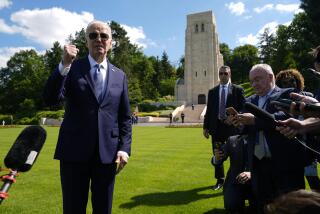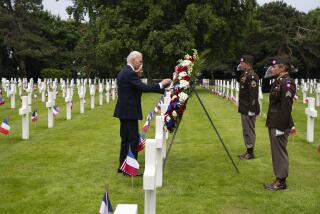Clinton Trip Ends With Oxford Honors
- Share via
OXFORD, England — Ending an eight-day journey of wartime remembrance on something of an off note, President Clinton returned Wednesday to Oxford University, the scene of his efforts 25 years ago to avoid military service in Vietnam.
Clinton, who received an honorary doctor of civil law degree in an elaborate, formal ceremony conducted largely in Latin, said his first obligation on this visit was to pay homage to those who conquered tyranny.
“There is no greater tribute to give to those who have gone before than to build for those who follow,” he said, speaking in the 300-year-old Sheldonian Theatre on the Oxford campus. “Surely, that is the timeless mission of freedom and civilization itself.”
The President--who with his wife, Hillary, also met in private with Rhodes Scholars and conducted a nostalgic visit to Blackwell Bookstore, where he had shopped as a student--was dogged by demonstrators for at least part of his day.
Students protested various causes--cuts in their benefits, abortion and the President’s attendance last week at a state dinner in Rome with leaders of a party with ties to Italy’s fascist past.
Their presence offered a pointed reminder of the President’s controversial past at this famed institution, which Clinton left in 1970 without completing its degree requirements because he was in a hurry to attend Yale Law School and launch his political career.
It was from Oxford that Clinton wrote the now-famous letter to the ROTC commander back in Arkansas to thank him for “saving me from the draft.” He participated in anti-war protests here and in London. And it was here, Clinton has acknowledged, that he experimented with marijuana, although he said he did not inhale.
Wednesday’s Oxford event and its echoes of Clinton’s ambiguous personal history came at the end of a European journey marked by emotional, politically effective D-day commemorative events. It followed a speech to the French National Assembly, where some members dozed.
Clinton’s trip has produced mixed coverage, both in Europe and the United States, with the President receiving high marks for his soaring, sentimental rhetoric at Normandy and other World War II sites and largely indifferent reviews for his presentation of American foreign policy.
A cartoon on the front page of Wednesday’s Le Monde, France’s most influential newspaper, shows Clinton standing by an old peace symbol lying on the ground of a military cemetery. An aged D-day veteran asks him, “Oh, did that fall out of your pocket?” Clinton, sweating bullets, replies, “No, no! It’s not mine!”
New poll results indicate that, while Clinton may get a temporary boost from the successful image-burnishing of the trip, it will have little effect on Americans’ overall rating of his presidency.
In a USA Today/CNN poll released Wednesday, Clinton’s job approval rating dipped below 50% and his negative ratings jumped from 42% to 47% in just the past two weeks. There was a two-point upward blip on his handling of foreign affairs--but only to 39%--while the share of Americans who approve of his performance on the economy fell to 47% from 50% in late May.
Clinton conducted largely ceremonial meetings with French, British and Italian leaders and with Pope John Paul II.
The people of Rome and Paris also were not overwhelmed by the First Couple. Officials of the U.S. Embassy in Rome had to round up stray Americans to fill a square when Clinton gave an address.
And while Paris welcomed the Clintons--and they seemed to relish a post-midnight romantic stroll Wednesday along the Pont des Arts, a few stolen moments together on a wooden footbridge with a view of the Eiffel Tower and Notre Dame Cathedral--there was none of the hysteria that marked a visit three decades ago by President John F. Kennedy and his wife, Jacqueline.
Some commentators, noting the current President’s fascination with J.F.K. and his frequent attempts to embrace his predecessor’s legacy, had suggested that France might find greater warmth for another young, vigorous, visiting President.
But Clinton impressed many with his tributes to the survivors and the fallen of the Italian campaign and the D-day landings. He and his speech writers produced several memorable phrases, including a description of the airmen who flew from Britain as “knights borne on wings.”
He moved many to tears at the cemetery above Omaha Beach when he addressed the veterans of D-day and the rows of graves of those who died there saying, “We are the children of your sacrifice.”
Clinton also spent many hours with current members of the American military, crossing the English Channel on the eve of the D-day anniversary aboard the aircraft carrier George Washington. His reception was much more favorable than his first visit to a carrier shortly after becoming President, when many of the young sailors openly expressed disrespect for him.
White House aides were heartened by Clinton’s improved bonding with the military. “He was very warmed by that experience and sobered by the thought that he might have to send some of them to their death,” said communications director Mark Gearan.
“The purpose of the trip was to honor the veterans,” Gearan said. “If this trip succeeded at anything, if the American people learned more about World War II and D-day and the valor of the men, then the mission has pretty much been accomplished.”
Clinton’s Oxford appearance was controversial at the White House, with most senior aides urging him not to go there because it was certain to generate news stories reminding Americans of a period in his life that has become a political sore spot for the President.
Trying to cover his own draft record, Clinton said in a radio interview before leaving Washington last week that former President Ronald Reagan “didn’t have conventional military service in World War II.” Reagan spent his Army years in Hollywood, making training and propaganda films.
Clinton also justified his anti-war activities by saying the nation’s “desire to uphold our end of the Cold War led us into a degree of involvement there which was in error.”
All in all, Clinton and his staff were pleased with the trip and the images they recorded of the President in his ceremonial role as commander in chief and spokesman for the nation.
But, as Clinton said at Oxford, “our obligations go beyond memory.” Difficult problems await him at home in the next few weeks: debate over welfare reform, hard bargaining on health care, a legal response to Paula Corbin Jones’ sexual harassment complaint and likely congressional hearings on the Whitewater affair.
For now, however, Clinton and his wife were feeling reflective after having conducted a national history lesson and enjoyed a moment of personal nostalgia.
“There were so many words and yet they couldn’t convey the magnitude of what we’re commemorating,” Mrs. Clinton said Tuesday of the previous day’s Normandy observances.
More to Read
Sign up for Essential California
The most important California stories and recommendations in your inbox every morning.
You may occasionally receive promotional content from the Los Angeles Times.













